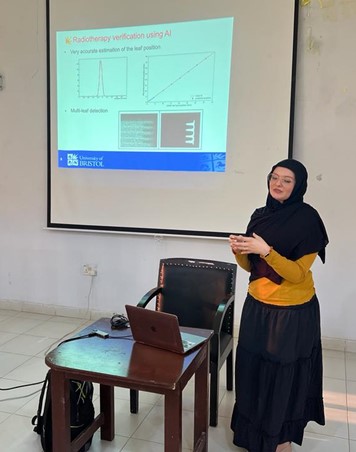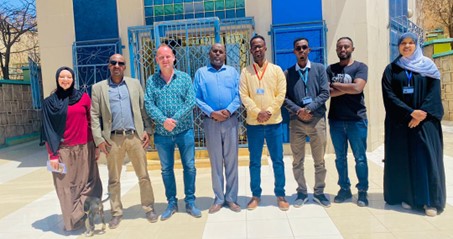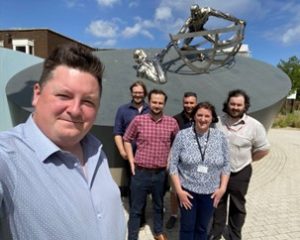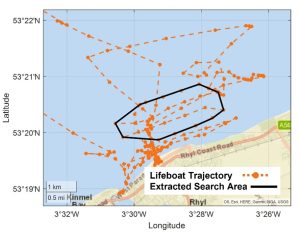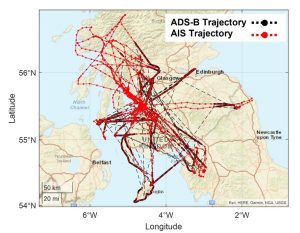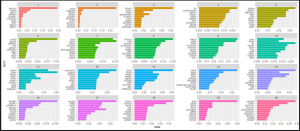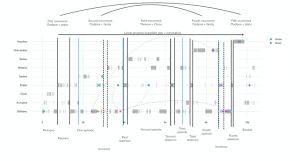Can sharing app data facilitate communication between young people and their mental health practitioner?
Bridget Ellis, Lucy Biddle, Helen Bould, Jon Bird
Mental health problems are increasing among young people, who have the highest prevalence of mental health problems among all age groups [1]. Despite the adverse outcomes that result from this, young people access mental health services at a lesser rate than other age groups [3], with barriers including communication, poor mental health literacy, embarrassment, fear of stigma and confidentiality concerns.
Research illustrates that digital peer support can help people with mental health difficulties [2] and the increased availability of mobile technologies is now being harnessed to deliver mental health support.
Our project was a collaboration with the company that created the award winning, NHS-endorsed young person’s mental health app, ‘Tellmi’ (www.Tellmi.help). The app is a fully moderated peer support environment, where young people anonymously share ‘tweet’ style posts about their emotional and mental health difficulties. A holistic dataset builds up for each individual which could have potential clinical value if shared with a healthcare practitioner. For example, the posts can be tagged for content, rated for severity, displayed longitudinally and presented in a shareable summary document.
Previous feasibility survey and interview data investigated the views of young people who used the Tellmi app, and Child and Adolescent mental health services (CAMHS) clinicians about the acceptability and utility of sharing such a summary document during mental health consultations as a means of enhancing the clinical exchange. Our current study had two aims: i) to carry out in-depth thematic analysis of this previously collected data; and ii) to form a multidisciplinary working group and convene a one-day workshop to present and discuss our findings as preparation for a full-scale research proposal.
We conducted thematic analysis on interviews with five young people and four healthcare practitioners, and 120 survey responses from users of Tellmi.
“So I think finding the words and putting them on Tellmi makes it easier to be able to say them to someone who is in front of you”
A theme was identified surrounding communication and how a summary document could be utilised to facilitate this between young people and healthcare practitioners. A concern raised by young people was that the way they communicate varies upon the audience they are communicating with, meaning a summary of the posts which they intended to be seen by peers may contain information they may not usually present to a clinician. Young people appear to value the written communication of Tellmi and were enthusiastic about how this could help to provide a focus and inform clinical sessions. For young people who struggle when trying to communicate their levels of distress with a clinician, this could be overcome through making it possible to share their experiences through their Tellmi posts. Additionally, providing a written account of how young people have been feeling may help to bridge a gap between the more honest and open information that is disclosed anonymously and that that is disclosed face-to-face with a clinician. However, young people did raise concerns about how this written information could be misconstrued or misinterpreted.
“If I feel comfortable with them then I’ll be more likely to share but if I don’t feel comfortable then I would not share”
We found that trust would play a key role in the process of sharing. This was not only trust between a young person and their clinician but also trust between a young person and Tellmi and how sharing could change how young people engaged with the app going forward. Clinicians also raised questions about trusting the Tellmi app, in particular how successfully an algorithm can identify risk or how the data being shared may be monetised.
“Tellmi posts do tend to be quite personal and honest and open because you expect to be talking to someone who isn’t really there so you can say whatever you like and there’s no judgement”
Young people seem to really value Tellmi as a safe space. This safety appeared particularly facilitated by the anonymity it provides. Young people were concerned about how their data may be handled if it was no longer anonymous and being shared with clinicians.
We also found practicalities surrounding sharing that would need to be addressed. For example, young people required control over their data and how it is used and shared. The potential of young people censoring the information they present to their clinician was also discussed. Additionally, the impact that revisiting old posts may have on young people was considered. Factors specific to clinicians could also impact sharing, with time being a concern for both clinician and young people.
“I think it’s [sharing a Tellmi summary] a great idea but the young people would need to have complete control of the information that is included to avoid endangering young people”
Workshop
Our multidisciplinary working group consisted of three researchers from computer science and health sciences, two child and adolescent psychiatrists, representatives from Tellmi, and two young people with lived experience of mental health difficulties. We presented our findings from the thematic analysis then used discussion sessions and group work to consider implications for the design of future research. We discussed how data sharing is likely to be most beneficial; how acceptability can be enhanced for young people and clinicians; stakeholders’ evaluations of the dummy data summary document of Tellmi posts, including methods of data visualisation; and potential barriers to data sharing in practice.
Discussion of the design for a user study of Tellmi data-sharing in practice identified this would involve varied stakeholders, including Tellmi users, researchers and clinicians. It was noted that recruitment could bring challenges and discussion sought to identify the most appropriate pathways for recruiting clinicians and young people in paired groups so that both perspectives can be captured for each case of data sharing. If recruiting through clinicians, it was noted that young people may not be Tellmi users or have enough data to produce a summary document. A suggestion for overcoming this was to ask young people to engage with Tellmi while on a waiting list. However, one of the lived experience advisors highlighted a challenge: “I think another issue with recruiting people through NHS is that no matter how good an app is, if you are young person on a waiting list and a clinician says, ‘Use this app,’ it’s like, ‘No, I want you to help me and why am I going to use an app?”. Alternatively, we discussed recruiting through the Tellmi platform and young people approaching their clinicians to get involved. However again, there would be challenges with this approach such as obtaining ethical approvals and clinical ‘buy in’ where relevant young people could be based all over the country.
We also discussed the practicalities of sharing and how a study procedure would be designed, focusing this discussion around the implications for design highlighted in our thematic analysis. This encompassed details determining how the process of sharing would actually take place. For example, we considered whether the summary would be shared as a physical document or an electronic copy, and whether this should be given to the young person to present to their clinician or be sent directly to the clinician. When to share is also a key consideration, our data showing young people have varied views around this and whether sharing should be repeated, and if so, at what frequency. Additionally, methods of improving and encouraging sharing were discussed, as well as the overall design of a summary document and how this could be altered to ensure inclusivity for special educational needs.
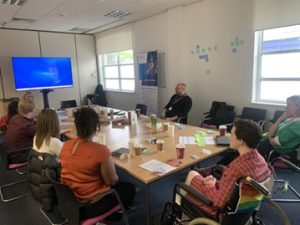
Key to designing a research study were methods of evaluation and establishing outcome measures. Young people and clinicians flagged a range of potential outcomes. These included completing clinical tasks such as goal setting, and how successful a young person may consider a session “something else to measure would be how the young person feels coming out of the appointment. Has it empowered them or let them take control of their healthcare”. The view of the young person was considered key in determining how outcome would be measured “it’s just making me think what is the actual point of sharing the data again? I guess that depends on the young person”.
The workshop provided a space for exciting discussion with input from stakeholders from different backgrounds. While we hoped it would allow elements of co-design to inform development of a data sharing document and research plans to evaluate this, challenges were raised which suggest further development work may be necessary before the process of sharing can be evaluated. The ideas and issues raised at our workshop will be explored through our continued collaboration with Tellmi.
“The workshop was incredibly insightful. It provided us the opportunity to discuss the findings of the study with a diverse group of experts including academics, clinicians and young people with lived experiences of poor mental health. It has helped us to completely rethink how to approach the problem and we look forward to continuing to work with the Bristol team.” Kerstyn Comley, Tellmi Co-CEO
